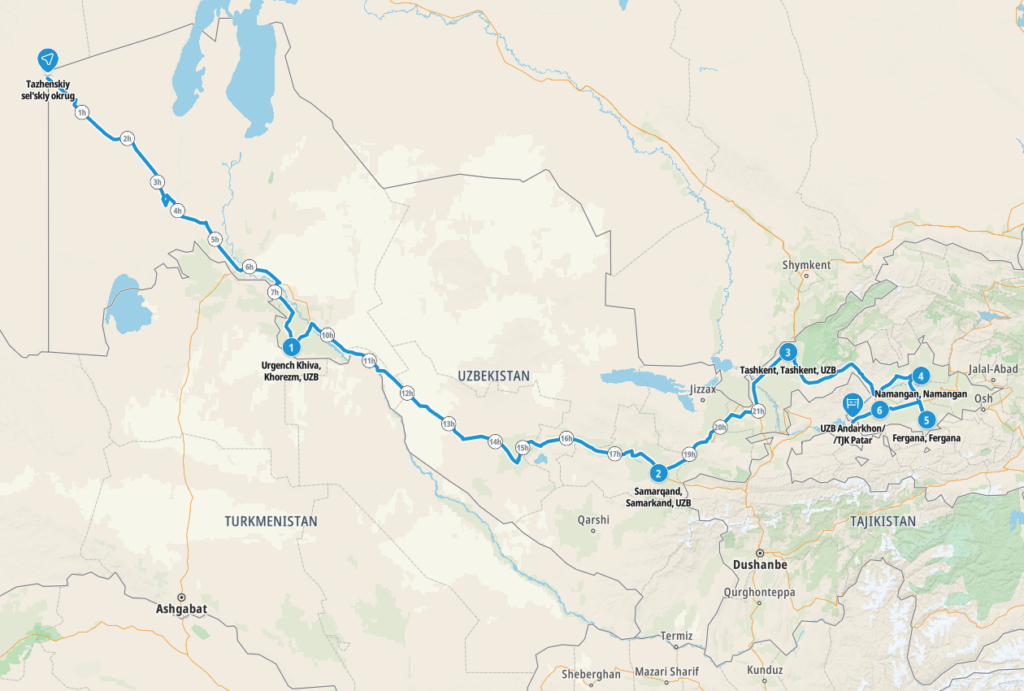Uzbekistan / Oʻzbekiston Respublikasi / Ўзбекистон Республикаси – Let’s explore here

What’s it like in Uzbekistan?
Uzbekistan is a very hot and dry, landlocked country in central Asia. In fact it is one of only two doubly-landlocked countries in the world, the other being Liechtenstein. A doubly-landlocked country is a country that is landlocked, and completely surrounded by other landlocked countries.
It’s about twice the size of the UK, and mainly consists of desert and mountains. The Aral Sea, formerly the third largest lake in the world, used to be located in Uzbekistan, until it dried up due to diversion of the rivers that fed it. The highest point in the country is Khazret Sultan, on the border with Tajikistan, at 15,233 ft (4,643 m) above sea level.
It has a very long, rich and interesting history. In former times it was a major trading and stopping point for those on the Silk Road. Its neighbours include Afghanistan, Turkmenistan, Kazakhstan, Tajikistan and Kyrgyzstan. In summer it reaches very high temperatures and due to the sand, in winter it’s very cold.
The population of Uzbekistan is around 37½ million people (2024), about three million of whom live in the capital, Tashkent.

A bit about the history of Uzbekistan
Early History
Uzbekistan’s history dates back to ancient times when it was part of key civilisations like the Achaemenid Empire, the Greco-Bactrian Kingdom, and later the Kushan Empire. The region was home to important cities along the Silk Road, including Samarkand and Bukhara, which were significant centers of culture, learning and trade.
Islamic and Mongol Influence
In the 7th century, Islam spread to the region, becoming the dominant religion. In the 13th century, the area was invaded by the Mongols under Genghis Khan, which led to the establishment of the Mongol Empire. The region eventually became part of the Timurid Empire under the rule of Timur (Tamerlane), who made Samarkand a major cultural and intellectual center.
Russian Empire and Soviet Rule
In the 19th century, the Russian Empire expanded into central Asia, including Uzbekistan. The region became part of the Russian Empire and later, after the Russian Revolution, was incorporated into the Soviet Union in 1924 as the Uzbek Soviet Socialist Republic. During Soviet rule, Uzbekistan underwent significant economic and social changes, including the development of its cotton industry, but also faced repression and forced collectivisation.
Independence and Modern Era
On September 1, 1991, following the dissolution of the Soviet Union, Uzbekistan declared independence. The country was led by its first president, who implemented economic reforms but maintained an authoritarian political system. The country focused on building a national identity, improving infrastructure, and developing its energy and agricultural sectors.
Recent Developments
In the 2000s and 2010s, Uzbekistan’s political environment remained tightly controlled, with limited freedoms. However, following the death of its long-standing president in 2016, his successor initiated a series of economic and political reforms, including improving relations with neighbouring countries, opening up the economy and addressing human rights concerns.

Uzbekistan road trip
On our current road trip through Uzbekistan, we’ll travel from Kazakhstan across the flat desert to the ancient cities of Khiva, Bukhara and Samaraqand. From there we’ll move on to the capital, Tashkent, before exploring the eastern cities of Namangan, Fergana and Kokand.
Map of our road trip through Uzbekistan

This is a map of our road trip through Uzbekistan. Our route takes us through Tajen – Khiva – Bukhara – Samaraqand – Tashkent – Namangan – Fergana – Kokand – Patar
What’s it like to drive in Uzbekistan?
They drive on the right hand side of the road in Uzbekistan. In the main, roads are quite poor, with many being unsurfaced dirt tracks. Driving standards are also quite poor.
Do you require an international driving permit in Uzbekistan?
We’ve created a dedicated page to driving abroad, which answers this question, and more, which you might find helpful.
Can you use your UK driving license when driving through Uzbekistan?
We’ve created a dedicated page to driving abroad, which answers this question, and more, which you might find helpful.
Do I need a carnet de passages to drive in Uzbekistan?
We’ve created a dedicated page to driving abroad, which answers this question, and more, which you might find helpful.
What currency do they use in Uzbekistan?
In Uzbekistan they use the Uzbek som. Cash is widely used. The use of credit / debit cards is not widely accepted outside of the capital, Tashkent, Samarkand and Bukhara. Travellers cheques are not accepted at banks. There are a few ATMs in all major cities now and in some towns. Dollars and Euros can be accepted for many purchases.
You should make yourself aware of the amount that your bank charges you for using credit and debit cards abroad. Often credit cards are cheaper for purchasing items directly, and for withdrawing cash from ATMs.
What language do they speak in Uzbekistan?
They speak Russian and Uzbek in Uzbekistan. English is not widely spoken outside of, or even inside the capital.
What time zone is Uzbekistan in?
Remember, when you’re planning your next trip to take a look at what time zone it’s in.
Do I need a visa to visit Uzbekistan?
We’ve created a dedicated, more comprehensive page on visas, which you should find helpful. Check it out!
Is wild camping legal in Uzbekistan?
Yes, wild camping is fine in Uzbekistan.
What plug / socket type do they use in Uzbekistan?
In Uzbekistan they use plug / socket types C and F.


Health issues in Uzbekistan
Is it safe to drink water in Uzbekistan?
No, it is not safe to drink tap water in Uzbekistan. Bottled water is readily available throughout the country.
What vaccinations are required for Uzbekistan?
This NHS website is kept up to date with all relevant information on vaccinations in Uzbekistan.
Phones in Uzbekistan
What is the country calling code for Uzbekistan?
The country calling code for Uzbekistan is +998
What are the emergency phone numbers in Uzbekistan?
- The emergency number for police in Uzbekistan is: 112 / 102
- In Uzbekistan, the emergency number for ambulance is: 112 / 101
- The emergency number for fire in Uzbekistan is: 112 / 103
If you’ve got some useful info that you’d like to share, let us know!
And don’t forget to check out all the other pictures!
